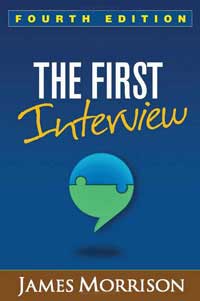 369 pages
369 pages8 CE credits
Course Enrollment
$200.00
Add to Cart
All exams are taken online. The exam for this course will be available in "My Courses" immediately upon enrollment. Note the book is not included.
The book is available for purchase from Amazon.
As an Amazon Associate we receive a rebate from qualifying purchases.
THE FIRST INTERVIEW, 4th Edition
James Morrison, M.D.The Guilford Press, 2014
DESCRIPTION
This trusted practitioner resource and course text is grounded in James Morrison's experience with more than 15,000 mental health patients. Morrison provides a complete framework for interviewing adult patients about their current symptoms, personal and family history, mental status, behavioral risks, and other relevant issues. He offers guidance for selecting the best strategy for any clinical situation, building rapport, overcoming common challenges, and communicating findings. Appendices include a detailed semistructured interview and a self-assessment tool for interviewers, both with permission to photocopy. Purchasers also get access to a Web page where they can download and print the reproducible materials in a convenient 8 1/2" x 11" size.
New to This Edition:
• Revised throughout for DSM-5
• Updated resources and suggested readings.
The reader will be able to:
• Create effective openings
• Determine chief complaint and encourage free speech
• Establish good rapport by being sympathetic, nonjudgmental, and respectul
• Obtain the history of the present illness and determine how it has affected the patient's functioning
• Recognize the importance of personal and social history
• Plan how to cover sensitive subjects and set boundaries
• Conduct mental status exams
• Recognize the areas of clinical interest, such as mood disorder, substance use disorder, cognitive issues, etc.
• Describe closure to your clients
• Determine diagnosis strategies and recommendations best suited to address the chief complaint and be prepared to share these findings with the patient
• Use interviewing techniques suggested by the author to communicate successfully with the patient
• Explain the process and importance of communicating your findings to others
AUTHOR
James Morrison, M.D., is Affiliate Professor of Psychiatry at Oregon Health and Science University in Portland. He has extensive experience in both the private and public sectors. With his acclaimed practical books -- including, most recently, Diagnosis Made Easier, Second Edition, and DSM-5 Made Easy, also in this catalog.
EDITORIAL REVIEWS"An absolute 'must read' for any clinician at any level of experience. This clearly written, highly practical, step-by-step guide to conducting the first interview is filled with wisdom. Morrison is sensitive to and respectful of the patient while recognizing the clinician's need to get as much information as possible. The Appendices are invaluable. I cannot think of another book that comes close to this masterpiece. Thank you, Dr. Morrison, for providing this essential guide."
--Robert L. Leahy, PhD, Director, American Institute for Cognitive Therapy; Department of Psychiatry, Weill Cornell Medical College
"With pressure to improve quality, availability, and the economic value of mental health care, an effective, efficient start to the therapeutic process is more important than ever. The First Interview, Fourth Edition, addresses the reality that whatever the therapists orientation, a successful therapeutic alliance depends on the first encounter. This gives the book universal appeal and will benefit novice and seasoned therapists alike. Science and personal experience are woven into a seamless work that reads like common sense but is based on a substantial body of evidence. In an easy-to-read, conversational tone, Morrison conveys empathic interviewing techniques that can win patients' trust and allow them to share the most intimate life details."
--Gary J. Kennedy, MD, Department of Psychiatry and Behavioral Sciences, Albert Einstein College of Medicine and Montefiore Medical Center
"As a clinician educator who teaches interviewing, I have been searching for accessible reading material that incorporates DSM-5 and is appropriate for medical students, psychiatry residents, and multidisciplinary mental health care providers. My search is over! This book integrates DSM-5 and the latest research on interviewing without compromising the art of clinical care. Rather than rigidly applying diagnostic categories or theoretical frameworks, Morrison helps clinicians become attuned to the nuances of the interview in a way that will make patients feel heard and understood. I know that my patients and my trainees' future patients will receive more thorough, compassionate care as a result of the abundant clinical insights in this book."
--Alana Iglewicz, MD, Department of Psychiatry, University of California, San Diego
"Morrison has written one of the most comprehensive texts on the principles, techniques, and practice of initial interviewing. This book is indispensable for students first learning to work with clients, as well as a valuable reference for experienced practitioners wishing to enhance their interviewing skills. Morrison presents sound and practical methods for establishing a warm and empathic therapeutic relationship, which in turn will help students and practitioners productively work with sensitive material."
--Roy Jerome, PhD, Department of Psychiatry, Icahn School of Medicine at Mount Sinai
"Very valuable.It has good tables, detailed outlines, and outstanding quotes that tell the reader what to say at any given time. The author also gives pointers on how to write up and conduct the interview.The experienced clinician will find this text a good review and a nice reference outline."
--American Journal of Psychiatry
"Beginning trainees, those preparing for certifying examinations of patients, and experienced clinicians could all benefit from reading this book....The book is richly illustrated with verbatim examples of effective and ineffective patient/n-/professional communications, with accompanying commentaries on the pros and cons of the verbal and nonverbal messages....This book has much to offer."
--Hospital and Community Psychiatry
ISHK CE at Home
1702-L Meridian Ave., #266
San Jose, CA 95125-5586
This website uses cookies to ensure you get the best experience on our website. Learn more
